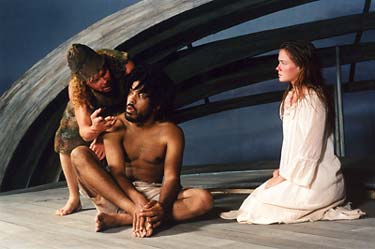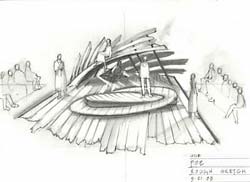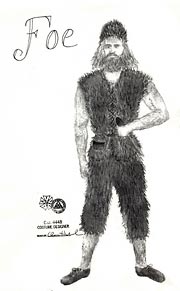Theater professor stages adaptation of J.M. Coetzee's "Foe"
 |
The "Foe" cast in rehearsal: Crusoe is played by Daniel Etcheverry, Friday is played by David Moore, and Amy Hattemer plays castaway Susan Barton. The production opens Oct. 3 in UC Berkeley's Zellerbach Playhouse. (Weiferd Watts) |
BERKELEY – Peter Glazer is gearing up for the University of California, Berkeley, stage premiere of his adaptation of South African author J.M. Coetzee's 1986 takeoff on the classic, "Robinson Crusoe."
 Peter Glazer is the veteran director, playwright, stage manager and a UC Berkeley assistant professor who adapted author J.M. Coetzee's "Foe" for the Zellerbach Playhouse performances. |
A veteran stage manager, director, playwright - and an assistant professor at UC Berkeley's Department of Theater, Dance and Performance Studies - Glazer has Coetzee's blessings to present his theatrical version of the novel, "Foe," at the campus's Zellerbach Playhouse Oct. 3-19.
Glazer has added his own touches to this story of colonialism, slave and master, gender, sexual politics, power, race, mystery and the fine art of storytelling. For instance, the key castaway in his version of "Foe" is a female.
He has been working on the adaptation for nearly six years, since his days at Northwestern University in Chicago, where he earned his PhD. He began preparations to stage his adaptation two years ago, when he arrived at UC Berkeley.
When an opportunity first came up to do a workshop production of an adaptation,"I don't remember the other books that I pulled out of my shelf," Glazer said. "This one just caught me right away. His (Coetzee's) language is just so remarkable. He's a brilliant writer, but this is a very unique book, the only time he's taken a preexisting story and redone it.
"That first paragraph was exciting to me as a writer, but even more, I could hear that language coming from the stage. And I really loved that he (Coetzee) was playing with such a huge icon of international culture, that being 'Robinson Crusoe.'"
Glazer has experience with adaptations. His "Woody Guthrie's American Song" (which premiered in 1988) took Guthrie's folk songs, prose and poetry and molded them into a stage musical.
"I knew that people had certain ideas about what 'This Land is Your Land' was as a song, and who Woody was as a figure," he recalled.
"With 'Foe,' I'm writing alongside the audience's expectations and using them to some extent, which is fascinating because Crusoe has such resonance," Glazer said.
"People think of adaptations of fiction like 'Masterpiece Theater,' where you're essentially just putting the book into pictures and transferring the dialogue," said William B. Worthen, chair of UC Berkeley's Department of Theater, Dance and Performance Studies. ""Peter has a much more theatrical sensibility."
 Kate Edmunds designed the three-sided stage made to look like planks retrieved from the sea. |
Glazer's contract with Coetzee is for the UC Berkeley performances of "Foe," but he hopes the adaptation goes further.
"It has a point of view," Glazer said. "It's exploring something that's both very entertaining but also has a strong intellectual content that I thought other theaters might find appealing."
The original "Robinson Crusoe," by English author Daniel Defoe, is said to be a fictionalized account of a true story that was recounted to Defoe about a male castaway on a deserted island off the coast of South America. Defoe was considered by many to be a plagiarist.
Coetzee's "Foe" offers intriguing changes from Defoe's version.
For example, Friday appears as a mute young African man whose tongue has been cut out. Crusoe is not out to convert Friday to Christianity, as he did in "Robinson Crusoe," and Friday observes certain unusual rituals. The writer Defoe is presented as Mr. Foe, actually Defoe's original name, and he is on the run from creditors. After Crusoe dies en route to England, castaway Susan Barton travels around the country with Friday as she tries to persuade a reluctant and elusive Foe to pen her true castaway story.
While Coetzee introduced a woman into the island story, Glazer's play has three, representing Susan at different points in time, space and maturity.
"Foe" will take place on a three-sided stage of lumber that looks like planks retrieved from the bottom of the ocean. Set designer Kate Edmunds, who also teaches scenic design at UC Berkeley, has incorporated oblique angles, pivoting sections and a backdrop of spare sky that allow the play to move from an island, to a London-bound ship, and finally to Foe's home.
The play's nine student actors have been assisted by Deborah Sussel, a UC Berkeley lecturer and professional dialect coach, in the mastery of their characters' standard British, Yorkshire and lower-class English accents.
 The ape-skin costume for Crusoe designed by Clare Henkel. |
Except for Crusoe, who is barefoot and dressed in ape skins, and Friday, the actors wear period costumes from the early 18th century.
Laura Levin, a PhD student in performance studies, has researched the history of the original "Robinson Crusoe," much of Coetzee's writings and personal history, and conditions in South Africa during apartheid.
As the play's assistant director and its literary adviser, she briefed the actors with background about Defoe, how "Robinson Crusoe" differs from Coetzee's "Foe," and how that informs Glazer's version.
Levin, who teaches a unit on South African theater in a course on issues in world theater, also has talked to the cast about South Africa during apartheid, the period when Coetzee wrote "Foe." Coetzee has been criticized, she said, for taking on the sensitive topic in an indirect and fictionalized way.
"But for him, history is the stories we tell each other," she said, calling Coetzee a "very psychological writer" who uses the personal to open onto the political.
The entire play, plus a 40-minute pre-show, will feature original compositions for acoustic and electric cello by Oakland musician Alexander Kort. A blend of ambient, melodic music will provide a bridge between the story's atmosphere and the deep meaning of the words of the script, Kort said.
For more the times and other details of the performances of "Foe," go to http://theater.berkeley.edu.

